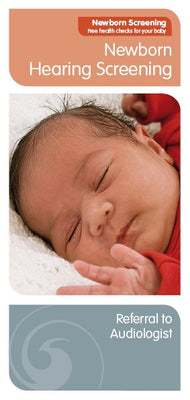Newborn Hearing Screening: Referral to an Audiologist - English - HE1924

Explaining why a baby might need further hearing screening tests and the procedures used. The resource includes a description of the auditory brainstem response (ABR) test and information about what help is available if a baby has a hearing loss.
The full resource:
Newborn Screening
Free health checks for your baby
Newborn hearing screening – referral to an audiologist
Your baby’s hearing screening shows that a further check is needed. You will be referred to a hearing specialist (audiologist) who will do more tests and give further advice.
Why does my baby need another test?
Some babies need another test because the earlier screening did not show a strong enough response in one or both ears. This may be because:
- your baby was unsettled
- there was too much noise in the testing room
- there was fluid in your baby’s middle ear that day
- your baby may have a hearing loss.
The audiologist will do a thorough check of your baby’s hearing and discuss the results with you.
What will the audiologist do?
The audiologist will do a range of diagnostic tests including an auditory brainstem response (ABR). This is similar to the earlier screening test but takes longer. Small sensors are placed on your baby’s head and a series of soft sounds is played into special earphones. Your baby’s responses to low-, middle- and high-pitched sounds are tested – we hear this full range of tones when different people speak.

How do I prepare my baby for the audiology appointment?
Your baby needs to be asleep during the testing. It’s best to go earlier than the appointment time so you can feed and settle your baby to sleep when you get there. Allow plenty of time for the visit – you may be there for a whole morning or afternoon. You are welcome to take your partner or another support person with you.

What if the audiologist says my baby does not show signs of a hearing loss?
Even if your baby passes the audiologist’s test, hearing loss can still develop later. You will probably be advised to have your baby’s hearing checked again if there are risk factors. The audiologist will tell you if your baby needs a follow-up appointment.
What happens if the audiologist says my baby has a hearing loss?
If the test shows your baby has a hearing loss, the audiologist will talk with you about the help available to your family and whānau. Together, you can plan what you would like to do next. It is best to start planning as soon as possible to help your baby develop language learning and social skills. The Well Child Tamariki Ora My Health Book also has suggestions about how to interact with your baby. These activities will help your baby develop good listening and communication. We recommend that all families follow these suggestions while waiting for the appointment, and whether the hearing test shows signs of hearing loss or not.
What help is available?
Your audiologist will see you and your baby for more appointments so that together you can learn more about your baby’s hearing. Your audiologist may refer you to a Ministry of Education Adviser. Advisers have training and experience in supporting young children with hearing loss and their families and whānau.
Health New Zealand | Te Whatu Ora and the Ministry of Education together oversee and monitor the Universal Newborn Hearing Screening and Early Intervention Programme.
What information is collected and how is it used?
As part of this screening, information required by the programme is collected by your local hospital and Health New Zealand | Te Whatu Ora about you and your baby.
The information collected includes names, baby’s date of birth, contact details, ethnicity, doctor and other carers, hearing screening information and results. It is used to:
- check that babies have been offered screening
- provide screening results to the family doctor and other maternity and health carers
- monitor, evaluate and report on the screening programme.
This information is held on a nationwide data system and may be shared with other child health information programmes and Well Child Tamariki Ora Services including the B4 School Check.
If your baby is found to have a hearing loss, this information is shared with the Ministry of Education to ensure early intervention services are offered to you and your child. This information is also provided to the Deafness Notification Database.
No published reports identify you or your baby in any way.
Further information
If you have further questions please let your lead maternity carer or hearing screener know.
Your rights
The code of Health and Disability Services Consumers’ Rights protects your rights. For more information go to Health and Disability Commissioner — Te Toihau Hauora, Hauātanga — Health & Disability Commissioner
The Health Information Privacy Code protects your personal details and gives you rights to access information about yourself and correct it. For more information see Office of the Privacy Commissioner | Home
The Well Child Tamariki Ora checks include questions for parents about their baby’s hearing, speech and language progress. If you have concerns about the way your child listens or responds, please discuss this with your Well Child nurse, early childhood teacher or your doctor.
For further information about newborn hearing screening, visit the Health New Zealand | Te Whatu Ora website: Universal hearing screening for newborns